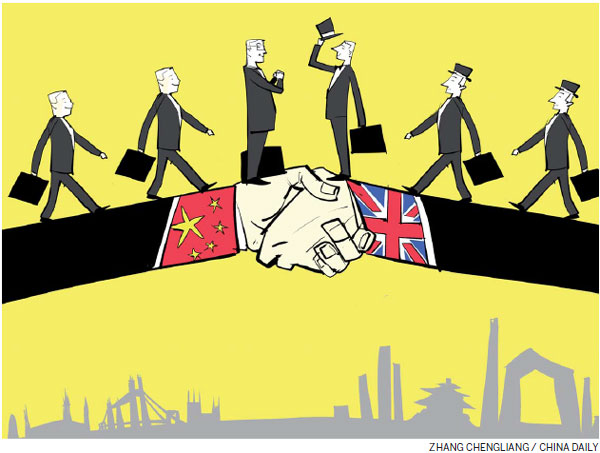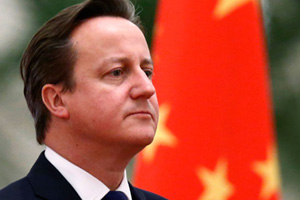
Forget big deals, small has its place too
Comments Print Mail Large Medium Small

Visit by China's Premier Li to Britain has produced huge opportunities for Smaller businesses
The visit to Britain by China's Premier Li Keqiang, his first as premier, rightly attracted huge media coverage.
His public appearances and presence, coupled with his command of English, have captured the attention of the British public far more than those of most other world leaders.
An audience with Queen Elizabeth II unequivocally symbolized the importance attached to bilateral relations.
The British government went out of its way to welcome Chinese investment and build on the visit of British Prime Minister David Cameron to China last year.
But, as expected, it is Sino-UK trade deals between giant multinationals that have dominated the headlines.
Chief among these are deals signed with BP and Royal Dutch Shell and the Chinese state energy giant China National Offshore Oil Corporation.

Also grabbing the headlines were deals and agreements between Rolls-Royce and one of China's largest nuclear reactor manufacturers, State Nuclear Power Technology Company; and the London Stock Exchange and two of China's largest banks, Bank of China and Agricultural Bank of China. The British government has made no secret of its desire to establish London as the global center for renminbi clearing, and this deal will undoubtedly help in this endeavor.
The trade deals and agreements signed during Li's visit amount to a little more than $30 billion (22 billion euros).
But what has remained largely invisible is the coverage of the boost Li's trip will no doubt provide for Sino-UK trade between each country's army of small and medium-sized enterprises.
SMEs are the sine qua non of sustainable economic development.
Li was accompanied by 200 business people on his trip, many representing China's substantial SME sector. He has long argued for more Chinese entrepreneurs and SMEs to lead the way during the Chinese economy's transition. Privatization and modernization of China's decreasing number but still monolithic state-owned enterprises is rumored to be in the offing.
It is, therefore, progress made with SME trade agreements and deals by which Li's first UK trade visit should also be judged.
Before highlighting just how important SMEs are to Britain and most other economies, it is important to provide a widely accepted definition. While financial criteria are commonly used to identify SMEs such as turnover and balance sheet details, by far the most widely used criterion is the number of employees.
British small businesses are usually those with no more than 50 employees. Medium-sized companies are those that do not employ more than 250.
With advances in technology, especially digital technology, small businesses are increasingly subdivided further into micro businesses, which employ fewer than 10.
Government figures from late last year cite almost 5 million companies in Britain that fall into the SME category, employing a total of a little more than 24 million people.
The most telling statistic of all is the combined GDP of British SMEs, which is rising and now stands at a little less than half of total GDP.
Even more impressive are the figures for Chinese SMEs. These combine to produce more than 60 percent of industrial output and employ about 80 percent of the country's work force.
It is with this in mind that perhaps the most important announcement during Li's trip is that Nord Engine, the Chinese financial services group, is to open its first overseas operation in Britain this year with up to 150 million pounds ($255 million, 187 million euros) available to invest in European small and medium-sized companies
Clearly, Li has thrown down the gauntlet to Britain's plethora of SMEs and will no doubt continue to entice the wider European SME sector.
In so doing, he understandably defined his visit by talking of wanting to build trust, ambition, confidence and partnership, aspects common in the corporate culture of internationally successful SMEs.
More than anything else on the trip, Li appeared determined to empower and encourage both UK and Chinese SMEs. Specifically, he made it clear that geographical proximity often provides a hugely misleading guide to export market attractiveness.
Perhaps both partners' SME sectors are equally culpable in this regard. All too often those few UK SMEs that establish a sizable and sustainable international market presence opt for neighboring European markets and English-speaking Commonwealth member states.
As a result, Li's visit has, hopefully, opened the eyes of the UK SME sector to the ample opportunities across China. Furthermore, Li emphasized the developing nature of the economy of the Chinese mainland, stressing trade opportunities increasingly outside China's first-tier cities of Beijing, Shanghai, Guangzhou and Shenzhen. Increasingly attractive western metropolises such as Chongqing and Chengdu are now firmly on the international business map. Moreover, China's second and third-tier cities generally should feature heavily on the UK SME radar.
For example, roughly one in four laptop computers in the world are now made in Chongqing, 55 million of them last year.
East China's Hangzhou and Northeast China's Dalian could also be grouped with Chengdu and Chongqing as some of the most developed and fastest developing second-tier cities.
Perhaps equally culpable of chasing those export markets closest to home are many of China's SMEs. In this regard, Li has referred to the important building blocks laid during Cameron's visit to China last year. More than half the business people who accompanied Cameron on that trip hailed from British SMEs.
Li has also referred to the multitude of SME China Forums taking place more and more across Britain. One of the biggest such forums took place in Manchester late last year.
While Li did not comment on specific Chinese SMEs, China's growing reputation for innovation in high-tech industries was put forward as a major industrial sector for potential UK SME partners. Other notable business opportunities for UK SMEs are clean energy and tourism, both of which will serve as increasingly important aspects of the Chinese economy.
Above all, Li's British visit should be interpreted by the country's SMEs as an unequivocal "open for business" statement.
In addition, China's modern, charming premier has also provided a warm, welcoming message to British SMEs.
As a result of his visit, they should now place China and the trade opportunities in Chinese SMEs firmly in the "opportunities" quadrant of any strengths, weaknesses, opportunities and threats analysis. China should not be seen as a threat, but as an opportunity and a priority for British SME internationalization.
Li possesses a cool persona, but his UK visit has ignited a red hot Sino-UK SME partnership path.
The author is a visiting professor at the University of International Business and Economics in Beijing and a senior lecturer on marketing at Southampton Solent University's School of Business. The views do not necessarily reflect those of China Daily.
(China Daily European Weekly?06/20/2014 page11)




